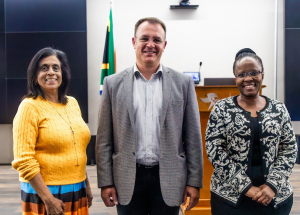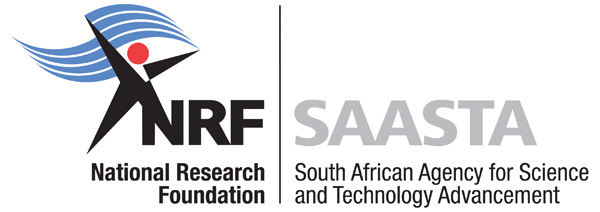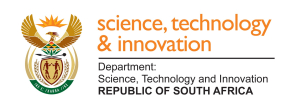NRF-SAASTA Lecture Highlights SAPRS Survey Findings and the Lessons for Science Engagement and Communication
25 October 2025

Image: NRF-SAASTA public lecture on the findings of the South African Public Relationship with Science (SAPRS) Survey with Dr Vijay Reddy, Dr Anton Binneman and Dr Mamoeletsi Mosia
South Africans hold a largely positive view of science and technology, but they want it to focus on addressing their everyday challenges such electricity, water and education.
This was outlined during a public lecture hosted by the NRF-SAASTA on the findings of the South African Public Relationship with Science (SAPRS) survey. The study, conducted in 2022 by the Human Sciences Research Council (HSRC) with support from the Department of Science, Technology and Innovation (DSTI), surveyed 6000 adults (16 years and older) across the country to assess public knowledge, attitudes, and engagement in relation to science and technology.
According to principal investigator, Dr Vijay Reddy, most South Africans recognise the value of science and technology for society. About 60% said they are aware of science and technology in South Africa.
However, the study also revealed important insights. About 78% of the respondents reported that advances in science and technology change our way of life as a society too fast and 68% expressed fears that new technologies will result in people losing jobs, while 66% indicated that scientific advances tend to benefit the rich more than the poor. “You can have both high promise and high reservations reflected in the same survey, that is perfectly normal,” Dr Reddy told the audience.
Trust levels remain strong, with over 65% of respondents saying they trust scientists, universities and research institutions as the most reliable sources of science and technology information.
When asked about research priorities, the public placed energy supply (electricity), cleaner and better water supply, quality of education, access to good quality food and health-related research at the top of their list, reflecting the country’s pressing social and economic challenges. “What people are responding to, what they want researched, is that which affects their daily lives,” said Dr Reddy.
NRF-SAASTA Managing Director Dr Mamoeletsi Mosia said the findings will guide future science engagement efforts. “The results will help us understand how to better communicate science and build stronger relationships with the public,” she said.
Dr Reddy concluded by emphasising that building public trust requires stronger, more intentional outreach. “If we want better attitudes towards science, we need better communication and dissemination of science and technology content,” she said.
The SAPRS survey will be repeated in 2027 to track changes in public attitudes and measure the impact of science engagement initiatives.
For those who missed out on this insightful lecture, there will be further events of this nature to engage with the SAPRS survey findings – so keep an eye out for future public lecture invitations.
The full SAPRS report and a highlights brief are available from https://www.saasta.ac.za/conferences/public-relationship-with-science-conference/ for readers who want detailed methodology and full tables from the 2022 baseline.

 The South Africa Agency for Science and Technology Advancement (SAASTA) is a business unit of the
The South Africa Agency for Science and Technology Advancement (SAASTA) is a business unit of the 